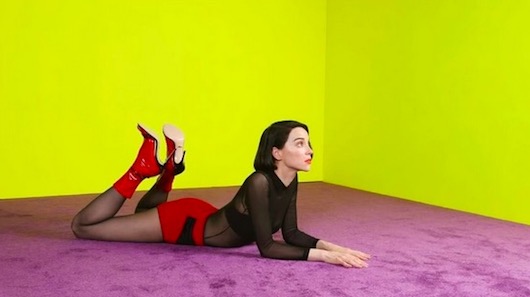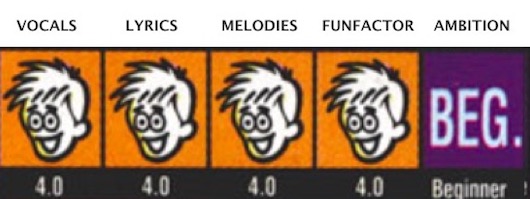 MUSIC
MUSIC In Which Casualties Hang From The Balcony
 Tuesday, October 24, 2017 at 9:00AM
Tuesday, October 24, 2017 at 9:00AM 
Begging You Please To Wake Up
by JANICE LEVENS

Masseduction
St. Vincent
producers Jack Antonoff, Annie Clark, Lars Stalfors and John Congleton
October 13th on Lorna Vista
A very cynical person — a far more cynical person than I — would call St. Vincent's new album Masseduction an album of Jack Antonoff covers. But this would not be really fair, since in having the good sense to use Antonoff as her producer and co-writer on the vast majority of Masseduction's tracks, Dallas native Annie Clark has made far and away the most exciting album of her career.
On the exceedingly dull detour of the past few years, involving a lengthy, unproductive collaboration with whatever was left of David Byrne, Clark has threatened to waste her primary skills as a musician and performer. Those would be her anthemic, flexible voice and her chameleon-esque synthesis of various styles of electronic music into what (this can no longer be denied) is a pop archetype. Some of the songs on Masseduction could easily have been recorded by Lady Gaga. "Los Ageless" in particular is the kind of empty vessel that could almost be covered by any artist.

As much as it would be easy to criticize Masseduction for being overly mainstream, the songwriting of Mr. Antonoff turns everything into a new wave Simon and Garfunkel deal. As a lyricist, Antonoff has few peers in his industry, and all the best tracks on Masseduction were written by him. His hopeful, angsty tone meshes perfectly with Clark's vocals on tracks like the magnetic "Happy Birthday, Johnny" which finds her singing, "Accused me of acting like all royalty, always for show, no true charity." It is not the best rhyme, but who cares? Quiet desperation is so rare these days.
This is not even the peak of the Antonoff-Clark combination. It is great fun to see Jack's focus on a tight, penetrable lyricism mix with the emotion Clark can put into her voice seemingly at will. You have to take a good deal on faith and credit to give two shits about a romantic vision of the Eiffel Tower ("I heard the robins and thought they were sirens" she explains on "Young Lover"). In order to enjoy the music of St. Vincent, you have to accept that a good portion of it will not feel authentic at all. Her strangled cry ("New love wasn't true love") still sounds good.
 with Fiona Apple
with Fiona Apple
By his own admission, Antonoff isn't the most polished singer, but he seems to have an endless supply of brilliant songs to offer to his collaborators. Among so many fully realized tracks, he seems to have no trouble knowing which ones are particularly suited to Clark's naivete. His summer album under the Bleachers moniker, Gone Now, kept most of his finest work for himself, and justly so, but I wish he had given "Everybody Lost Somebody" to Annie.
In Clark's most ostensibly emotional moments, there remains the pervasive hint of phoniness, but this is a symptom of 35 representing the very beginning of middle age for most in her generation. Her voice alone papers over this hesitation. Working with Antonoff is a massive change; shaking off even more of her musical past would be too much of an imposition. On "Smoking Section" she sings, "Sometimes I stand with a pistol in hand: I fire at the grass just to scare you" as if there could be no other reason. "I sway in place," she offers on "Slow Disco", admitting "I'm so glad I came but I can't wait to leave."

Janice Levens is the music editor of This Recording. She is the pseudonym of a writer living in Los Angeles. You can find an archive of her writing on This Recording here.






































